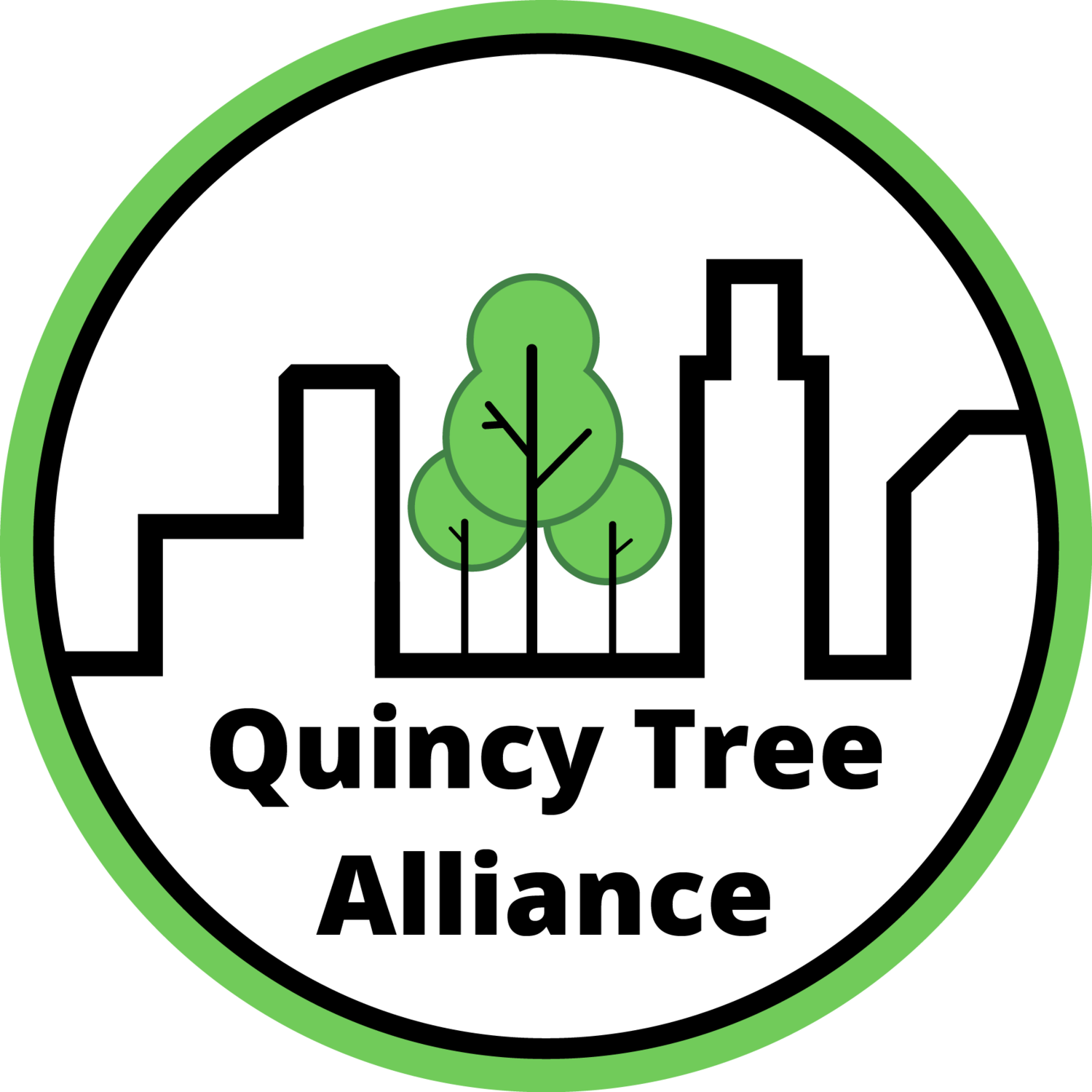Tree hearing on July 13
UPDATE on July 23: Watch the tree hearing below!
Tree warden Chris Hayward will hold a hearing on Tuesday, July 13, at noon, about 11 trees being considered for removal here in Quincy. The hearing is open to the public and will be held in person at the Quincy Parks & Rec meeting room at 1 Merrymount Parkway.
We encourage you to attend, or to write public comments that will be read at the meeting (send them to chayward@quincyma.gov by 11 am on July 13). To help provide context for those comments, below you’ll find QTA’s calculation of the benefits of the trees to neighboring houses and our position on each tree up for possible removal.
Callery pears @ 97 East Howard Street
QTA’s position: Callery pear trees like these are prone to injury and are non-Native, with invasive tendencies, so QTA is not opposed to these trees being removed for a new development. That being said, we want the new development to include numerous and diverse trees in its plans for the property, and we would like to see those plans.
Norway maple at 75 Ames St, 30 feet from two houses
(Image: David Shiga)
QTA’s calculation of this tree’s benefit to nearby houses:
Energy savings per year: $20
Electricity Savings (A/C): 27 kWh
Fuel Savings (natural gas, oil): 1 MMBtu
Lifetime carbon stored: 2.8 tons
Carbon captured per year: 96 pounds
Stormwater runoff avoided per year: 670 gallons
QTA’s position: We would like this healthy tree to remain, and for the DPW to include planning around trees when it does street improvements – both on the sidewalk and on the curb side. Ideally the DPW plans would include providing adequate soil volume for trees to grow to their maximum potential sizes.
Norway maple at 79 Ames, 20 feet from house
(Image: Photo from Google Maps)
QTA’s calculation of this tree’s benefit to the homeowner at 79 Ames:
Energy savings per year: $18
Electricity Savings (A/C): 19 kWh
Fuel Savings (natural gas, oil): 1 MMBtu
Lifetime carbon stored: 4.5 tons
Carbon captured per year: 84 pounds
Stormwater runoff avoided per year: 720 gallons
QTA’s position: The resident has other large canopy trees in their yard, making this one *somewhat* less critical to keep. However, expanding the driveway, a surface that does not allow water to pass through it, opposes the good that trees do in helping to take up water and reduce flooding. In addition, good tree cover in a neighborhood increases the value of houses by 6-9% ($34,000 - $52,000 per house based on average home price in Quincy, and that might be an underestimate in this neighborhood), so this resident and their neighbors might prefer to keep this healthy tree just for the financial benefits of living in a leafy neighborhood.
Ash @ 93 Ames Street, 20 feet from house
(Image: David Shiga)
QTA’s calculation of this tree’s benefit to the homeowner at 93 Ames:
Energy savings per year: $38
Electricity Savings (A/C): 40 kWh
Fuel Savings (natural gas, oil): 2 MMBtu
Lifetime carbon stored: 4.1 tons
Carbon captured per year: 94 pounds
Stormwater runoff avoided per year: 1,500 gallons
QTA’s position: We are looking forward to a discussion of the emerald ash borer and the risks it poses to ash trees of various health levels. Absent information to the contrary, we are likely to defer to the tree warden’s expertise on this tree. In any case, we would like to know if the city has an inventory of ash trees and their health, so that the healthiest might be preemptively treated with insecticides to prevent emerald ash borer infestations.
Red oak @ 48 Miles Drive, 20 feet from house
(Images: David Shiga)
QTA’s calculation of this tree’s benefit to the homeowner at 48 Miles:
Energy savings per year: $47
Electricity Savings (A/C): 152 kWh
Fuel Savings (natural gas, oil): 0.9 MMBtu
Lifetime carbon stored: 7.4 tons
Carbon captured per year: 148 pounds
Stormwater runoff avoided per year: 3,000 gallons
QTA’s position: We want this healthy tree to remain. "Oaks support more forms of life and more fascinating interactions than any other tree genus in North America," writes scientist Douglas Tallamy in his new book, The Nature of Oaks. FYI: The city has information about tree roots and utility lines here. If a resident is sure that roots are causing issues in their pipes, the best remedy is to replace the section of pipe affected. Alternatively, the pipe can be rodded with a pruning head.
Please write in or attend the meeting in person!










